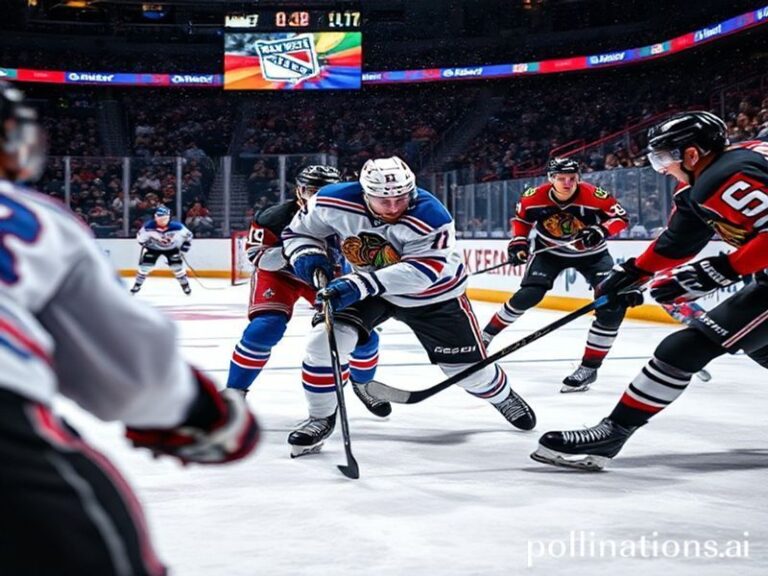Santos vs São Paulo: When a 115-Year-Old Grudge Match Becomes the World’s Most Watched Metaphor
Rio de Janeiro – Somewhere in the luminous sprawl that Brazilians politely call a city, two footballing tribes prepared last night to re-enact a 115-year-old grudge match whose geopolitical footprint now reaches further than most UN peacekeeping missions. Santos versus São Paulo, the coastal pearl versus the concrete leviathan, is no longer a provincial squabble over bragging rights and beachfront property. In 2024, it is a laboratory for late-stage capitalism wearing neon boots, a morality play about nostalgia, oil money, and the curious human habit of turning leather spheres into existential statements.
The fixture itself is ancient—older than sliced bread, commercial aviation, and, regrettably, several modern democracies. But the global resonance is brand-new. Kick-off at Vila Belmiro was scheduled for 21:30 BRT, which translates to 01:30 in Frankfurt trading rooms, 07:30 in Seoul crypto chat rooms, and “who-cares-o’clock” on Wall Street, where the only Brazilians anyone notices are the ones testifying to Congress. Meanwhile, Premier League scouts circled above like well-tailored vultures, Qatari investors refreshed the Transfermarkt page on their super-yachts, and Chinese streaming services counted pay-per-view clicks with the cold enthusiasm of bean-counters who have never seen a bean.
Santos, once the cradle of Pelé and a thousand YouTube highlight reels, arrived at this match a cautionary tale. Relegated last season to Série B for the first time since the Titanic failed its maiden MOT, the club now flirts with the sort of financial necromancy usually reserved for European aristocrats: hedge-fund credit lines, NFT ticketing experiments, and, rumor has it, negotiations to rename the stadium after a popular brand of coconut water. The ultras wave flags emblazoned with “Memória Nunca Vende” (Memory Never Sells), apparently unaware that memory has been on clearance since 2008.
Across the philosophical aisle stands São Paulo FC, the inland empire’s answer to controlled chaos. Three-time world champions, currently fourth in the league, and majority-owned by a conglomerate that also sells toothpaste, poultry, and—why not—military satellites. Their midfield is anchored by a 19-year-old whose release clause is higher than the GDP of three Pacific island nations, and whose surname already appears on Barcelona’s Christmas list. The club’s official Twitter account greeted derby day with a slickly produced video set to Wagner’s “Ride of the Valkyries,” because nothing says working-class authenticity like 19th-century German opera auto-tuned to EDM.
Yet the wider world watches less for the football than for the metaphor. Santos versus São Paulo is Brazil in microcosm: the mythic coastline versus the vertical ambition; the sugar-cane past versus the soy-protein future; the carnival of memory versus the spreadsheet of destiny. European viewers see a preview of what happens when tradition meets sovereign wealth funds. American audiences recognize the plot line of a Netflix docu-series waiting to happen. Asian markets simply want to know which teenage phenom will be wearing their club colors by Q3.
Bookmakers in London report that 62 % of in-play bets now originate from smartphones in countries that have never qualified for a World Cup but whose central banks still keep a weather eye on Brazilian interest rates. Cryptocurrency exchanges offer fan tokens that fluctuate more wildly than the actual score line, proving once again that our species will gamble on literally anything except climate policy.
On the pitch, the game ended 1-1, a result so perfectly balanced that conspiracy theorists immediately suspected algorithmic interference. The Santos equalizer came from a 35-year-old striker who once played for São Paulo and celebrated like a man repaying a mortgage with one knee-slide. São Paulo’s opener was scored by a midfielder born in 2005 who celebrated by pulling out an imaginary phone and posting to an imaginary audience, a gesture that instantly became a TikTok trend among teenagers who have never seen a landline.
Which brings us, grimly, to the moral of the story: national derbies used to decide who owned the city streets until Monday. Now they decide who owns the data stream until the next quarterly earnings call. Somewhere in the afterglow, Pelé’s ghost presumably shrugged, muttered something about jogo bonito, and asked for directions to a quieter eternity.







